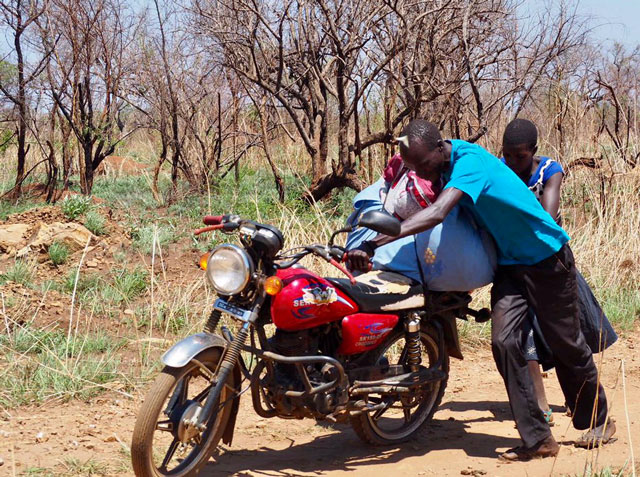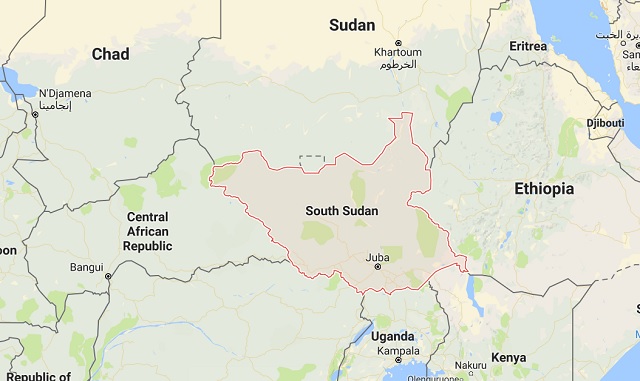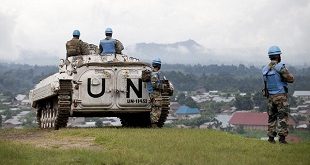
Ngomoromo, Uganda | AFP | Michael O’HAGAN | In the no man’s land between South Sudan and Uganda wind lashes though scrubland, whipping hot dust into the eyes of David Otong Oroma and his sister as they struggle to push their heavily laden motorbike over the border.
The pair fled from the South Sudanese town of Pajok, an ethnic Acholi agricultural and trading community which pro-government forces attacked on Monday 3 April, killing at least 85 people, according to witnesses.
Refugees told AFP how soldiers from the government’s Sudan People’s Liberation Army (SPLA), along with allied militiamen, entered the town with armoured vehicles and unleashed violence against civilians in the latest bloody episode of a three-year civil war.
“Anybody they found there they would just shoot,” said Otong, 36, a counsellor who works with deaf people.
“Those SPLA they term us all as rebels and they kill us. That is why I ran to the bush.”
After days of increasing tension as SPLA soldiers surrounded Pajok, shortly before 8am on that Monday — just as people were getting ready for work and school — a gun mounted armoured vehicle burst onto the main street.
Men wearing SPLA uniforms followed behind and immediately opened fire – apparently targeting male civilians.
– ‘Not a normal operation’ –
Robert, 31, a maths teacher and community leader who preferred not to give his last name, knew immediately that this attack was different from previous skirmishes.
“Three civilians had already been killed in those first minutes and the place was covered in soldiers. Seeing the government breaking down doors and looting the properties – that was not a normal operation. We had to make a quick decision to evacuate the civilian population,” he said.
From the lion’s face insignia on their badges, witnesses recognised soldiers from the notorious Lion Brigade unit commanded by SPLA general Santino Deng Wol, mixed with the khaki uniforms of the National Security Service — a feared intelligence organ.
In this region, Pajok is seen as sympathetic to a fractured and diverse rebel force linked to former vice president Riek Machar, fighting government troops loyal to his foe President Salva Kiir.
A power struggle between the two men led to an outbreak of civil war just two years after South Sudan won independence.
The conflict initially pitted Kiir’s Dinka supporters against Machar’s Nuer community, but fighting has metastasised with other ethnic groups taking sides or turning against each other.
Refugees described how Acholi militiamen from neighbouring Magwi — which is pro-government — attacked alongside regular soldiers.
“The crisis in South Sudan is basically ethnic. Here Acholi people were used against their fellow Acholi,” said Robert.
Kiir is regularly accused of unleashing private militias in the fight against the rebels.
South Sudan government spokesman Michael Makuei last week confirmed to AFP that troops had gone to take Pajok from the rebels.
“In any fighting there must be casualties,” he said.

– ‘We counted 85 dead’ –
Okumu Philip Paulino, 29, escaped being shot by rolling on the ground as bullets flew overhead.
He was arrested, beaten and taken to the Atebi River Hotel in the centre of town where Deng had set up a command post.
Later that day, Deng identified the warehouse manager as being particularly well-educated among the prisoners, and he was sent out to tally the number of dead in the streets.
“We counted 85 people including three ladies,” said Philip.
“I organised the youth among the prisoners and asked to be allowed to bury the bodies. I carried the first person to be shot – Charles Ogeno. He died and I carried him. All my body was covered in blood.
“Then we buried together a man called Onen, then Jacob, then Paul, then Amos – they shot him with his hands up. I tried to carry him while he was still alive but the blood was coming from his body and I couldn’t lift him until his life had completed.”
Exhausted and overcome by the stench of bodies decomposing in the heat, Philip is haunted by those he could not bury.
“I pulled a 17-year-old girl and her mother who had been shot from the river because people were using the water … I was very tired – I didn’t have the energy to bury them. I put a big stone by another man and covered him in a tarpaulin.”
Inside an army barracks, Philip found the bodies of 18 men and a woman.
– Soldiers take turns raping –
A day after the attack, a woman approached Philip and said that she had been raped.
“She said one soldier was keeping people away by shooting a bullet while another” raped her, said Philip. The two men then traded places.
“I gave her painkillers and took her to the commander who punished the soldiers. He gave them 100 lashes and released them.”
The feared SPLA general Deng has been on a UN sanctions list since mid-2015 facing allegations of war crimes.
Along with a few other men, Philip eventually escaped after convincing Deng that he was going to collect his family and return.
He made it to a makeshift refugee camp where some 5,000 Pajok residents are living in squalor inside the Ugandan border. The UN refugee agency plans to move them to a more formal settlement.
Uganda already hosts over 830,000 South Sudanese refugees — some in what is now the world’s largest refugee camp — who are given a plot of agricultural land and are free to move around the country.
However, with no end in sight to the war, questions are being raised about how sustainable the response is.
Glancing over his shoulder in the direction of Pajok, David Oroma, like many refugees, says he will never return.
“It’s better to die somewhere in hell rather than South Sudan.”
 The Independent Uganda: You get the Truth we Pay the Price
The Independent Uganda: You get the Truth we Pay the Price



